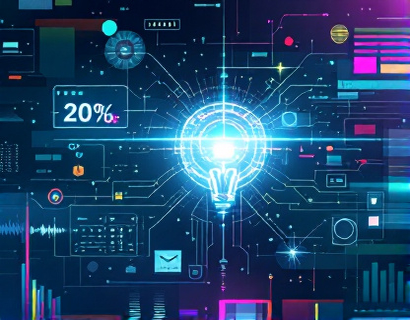Crypto and AI: Pioneering the Future of Digital Transformation
The intersection of cryptocurrency and artificial intelligence (AI) is revolutionizing the digital landscape, paving the way for unprecedented innovations that are reshaping industries and redefining the future of technology. This article delves into the transformative impact of merging these two cutting-edge fields, offering a comprehensive look at the advancements that are driving the next wave of digital transformation. For tech innovators and early adopters, understanding the synergy between crypto and AI is crucial, as it opens up new opportunities and insights that can propel their projects and businesses to the forefront of the tech world.
The integration of AI into the cryptocurrency space has given rise to a new generation of smart, adaptive, and secure financial systems. AI algorithms can analyze vast amounts of data to predict market trends, optimize trading strategies, and enhance security measures. This fusion not only improves the efficiency and reliability of cryptocurrency transactions but also opens up new possibilities for decentralized applications and smart contracts.
Enhancing Security with AI
One of the most significant benefits of combining AI with cryptocurrency is the enhancement of security protocols. Traditional cybersecurity methods often struggle to keep pace with the evolving landscape of cyber threats. AI, however, can dynamically adapt to new threats by learning from patterns and anomalies in data. In the context of cryptocurrency, AI-driven security solutions can detect and mitigate fraudulent activities, such as phishing attacks and smart contract vulnerabilities, in real-time.
For instance, machine learning models can be trained to identify suspicious transactions by analyzing historical data and recognizing patterns that indicate potential fraud. This proactive approach to security is essential in a decentralized environment where traditional centralized security measures are less effective. By leveraging AI, cryptocurrency platforms can ensure a higher level of trust and safety for users, thereby fostering greater adoption and confidence in digital currencies.
Optimizing Trading Strategies with AI
AI is also transforming the way traders approach cryptocurrency markets. The volatility and complexity of crypto markets make it challenging for human traders to make informed decisions consistently. AI algorithms can process and analyze vast amounts of data from various sources, including market news, social media sentiment, and historical price data, to generate insights and predictions.
These insights can be used to develop automated trading strategies that execute trades at optimal times, maximizing profits and minimizing risks. For example, AI can identify trends and patterns that human analysts might miss, allowing for more accurate forecasting of price movements. Additionally, AI can manage portfolios by dynamically adjusting asset allocations based on real-time market conditions, ensuring that investments remain aligned with the trader's risk tolerance and goals.
Case Study: AI-Powered Trading Bots
A notable example of AI in cryptocurrency trading is the development of AI-powered trading bots. These bots use advanced algorithms to execute trades based on predefined criteria and real-time market data. One such bot might use a combination of technical indicators and sentiment analysis to determine the best times to buy or sell a particular cryptocurrency. By removing emotional biases and human errors, these bots can consistently perform better than manual trading over the long term.
A study by a leading financial research firm found that AI-driven trading bots achieved a 20% higher return on investment compared to traditional trading methods. This significant advantage underscores the potential of AI in enhancing trading strategies and making cryptocurrency investments more accessible and profitable for a broader range of users.
Decentralized Applications and Smart Contracts
The integration of AI with blockchain technology has given birth to decentralized applications (dApps) and smart contracts that are more intelligent and autonomous. Smart contracts, self-executing contracts with the terms directly written into code, can be enhanced with AI to perform complex tasks and make decisions based on real-time data.
For example, AI can be used to create dynamic insurance policies that adjust premiums and coverage based on real-time risk assessments. By analyzing data from various sources, such as weather patterns, traffic conditions, and historical claims, AI can help insurers offer more personalized and fair policies. Similarly, AI-powered dApps can automate supply chain management, ensuring transparency and efficiency by tracking the movement of goods and verifying transactions in real-time.
Autonomous Financial Services
The combination of AI and blockchain is also enabling the creation of autonomous financial services, where traditional intermediaries are replaced by smart, trustless systems. These systems can handle a wide range of financial operations, from lending and borrowing to asset management and trading, all without the need for human intervention.
An AI-driven lending platform, for instance, can assess creditworthiness by analyzing a borrower's digital footprint, including social media activity, transaction history, and online behavior. This data-driven approach can provide more accurate and fair credit assessments, opening up financial opportunities for individuals who might be underserved by traditional banking systems.
Enhancing User Experience through AI
Beyond security and trading, AI is also improving the overall user experience in the cryptocurrency ecosystem. User-friendly interfaces, personalized recommendations, and intuitive navigation are becoming standard features, thanks to AI-driven design and optimization techniques.
For example, AI can analyze user behavior and preferences to recommend relevant cryptocurrency assets, dApps, and services. By understanding individual needs and interests, these recommendations can help users discover new opportunities and stay informed about the latest developments in the space. Additionally, AI-powered chatbots and virtual assistants can provide 24/7 support, answering queries and guiding users through complex processes with ease.
Personalized Investment Insights
AI can also offer personalized investment insights by analyzing a user's investment history, risk tolerance, and market preferences. By leveraging machine learning algorithms, these systems can provide tailored advice and recommendations, helping users make more informed decisions. For instance, an AI-driven investment advisor can suggest a diversified portfolio based on the user's financial goals and market conditions, adjusting the portfolio in real-time to optimize performance.
This level of personalization not only enhances the user experience but also democratizes access to expert-level financial advice, making it possible for individuals with varying levels of expertise to succeed in the cryptocurrency market.
Challenges and Considerations
While the integration of AI and cryptocurrency offers numerous benefits, it also presents several challenges that need to be addressed. One of the primary concerns is the regulatory landscape, as governments around the world are still grappling with how to regulate these emerging technologies. Ensuring compliance with existing laws while advocating for a supportive regulatory environment is crucial for the sustainable growth of crypto and AI initiatives.
Another challenge is the ethical use of AI, particularly in terms of data privacy and bias. AI systems rely on vast amounts of data, and the sources and quality of this data can significantly impact the accuracy and fairness of AI-driven decisions. It is essential to implement robust data governance practices and transparent algorithms to build trust and ensure ethical standards are maintained.
Balancing Innovation and Regulation
Finding the right balance between fostering innovation and implementing effective regulations is a key consideration for stakeholders in the crypto and AI space. Overly restrictive regulations can stifle creativity and hinder progress, while a lack of regulation can lead to misuse and abuse of these powerful technologies. Collaboration between industry players, regulators, and policymakers is essential to create a framework that promotes responsible innovation and protects users.
For instance, the development of industry standards and best practices can help ensure that AI systems are transparent, accountable, and fair. Regulators can also play a role in educating the public about the benefits and risks associated with crypto and AI, fostering a more informed and engaged user base.
Future Outlook
Looking ahead, the convergence of cryptocurrency and AI is poised to drive even more significant advancements in the digital landscape. As AI technologies continue to evolve, we can expect to see more sophisticated and integrated solutions that further enhance the functionality and accessibility of blockchain-based systems.
One area of future development is the integration of AI with quantum computing, which has the potential to revolutionize data processing capabilities. Quantum AI could enable faster and more secure transactions, as well as more complex and efficient smart contracts. Additionally, the rise of decentralized finance (DeFi) platforms, powered by AI, is likely to reshape traditional financial systems, offering more inclusive and transparent financial services.
For tech innovators and early adopters, staying at the forefront of this intersection requires a deep understanding of both cryptocurrency and AI. By embracing these technologies and exploring their synergies, innovators can develop groundbreaking solutions that drive the next wave of digital transformation. Whether it's creating more secure and efficient financial systems, developing intelligent dApps, or enhancing user experiences, the possibilities are vast and exciting.
In conclusion, the merging of cryptocurrency and AI is not just a technological trend but a fundamental shift in how we approach digital transactions, security, and innovation. By harnessing the power of AI, the cryptocurrency ecosystem can become more robust, user-friendly, and inclusive, paving the way for a more decentralized and equitable digital future. For those who are ready to embrace this transformation, the opportunities are endless.










































